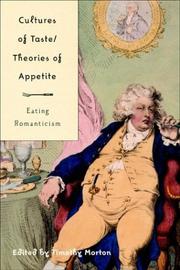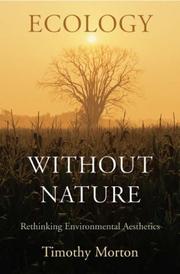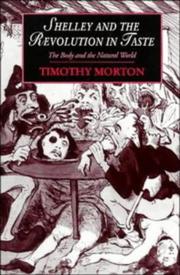| Listing 1 - 10 of 45 | << page >> |
Sort by
|

ISBN: 0312293011 0312293046 Year: 2004 Publisher: London : Palgrave Macmillan,
Abstract | Keywords | Export | Availability | Bookmark
 Loading...
Loading...Choose an application
- Reference Manager
- EndNote
- RefWorks (Direct export to RefWorks)
Comparative literature --- Thematology --- History of civilization --- Appetite. --- Dinners and dining in literature. --- Food habits in literature. --- Food habits. --- Food preferences. --- Taste. --- Habitudes alimentaires --- Alimentation --- Nourriture --- Aspect social --- Dans la littérature
Book
ISBN: 0521533430 9780521533430 0521826047 9780521826044 1139001116 1139817051 9781139001113 Year: 2006 Publisher: Cambridge : Cambridge University Press,
Abstract | Keywords | Export | Availability | Bookmark
 Loading...
Loading...Choose an application
- Reference Manager
- EndNote
- RefWorks (Direct export to RefWorks)
Percy Bysshe Shelley (1792-1822) was an extraordinary poet, playwright and essayist, revolutionary both in his ideas and in his artistic theory and practice. This 2006 collection of original essays by an international group of specialists is a comprehensive survey of the life, works and times of this radical Romantic writer. Three sections cover Shelley's life and posthumous reception; the basics of his poetry, prose and drama; and his immersion in the currents of philosophical and political thinking and practice. As well as providing a wide-ranging look at the state of existing scholarship, the Companion develops and enriches our understanding of Shelley. Significant new contributions include fresh assessments of Shelley's narratives, his view of philosophy, and his role in emerging views about ecology. With its chronology and guide to further reading, this lively and accessible Companion is an invaluable guide for students and scholars of Shelley and of Romanticism.
Shelley, Percy Bysshe --- English --- English Literature --- Languages & Literatures --- Shelley, Percy Bysshe, --- Criticism and interpretation. --- Shelley, P. B. --- Sheli, Persi Bish, --- Hsüeh-lai, --- Hermit of Marlow, --- Marlow, --- Victor, --- Shelli, Persi-Bishi, --- Šéli, Pérsi Ba, --- Shilī, --- Selley, Persy Byss, --- Shelli, P., --- Шелли, Перси Биши, --- שלי, פרסי ביש --- שלי, פרסי ביש, --- שעלי, פוירסי --- شلي --- Śeli, Pārsi Bīśa, --- Shelley, Percy Bysshe (1792-1822) --- Critique et interprétation
Book
ISBN: 9780231177528 0231177526 9780231541367 0231541368 Year: 2016 Publisher: New-York : Columbia University Press,
Abstract | Keywords | Export | Availability | Bookmark
 Loading...
Loading...Choose an application
- Reference Manager
- EndNote
- RefWorks (Direct export to RefWorks)
Timothy Morton argues that ecological awareness in the present Anthropocene era takes the form of a strange loop or Möbius strip, twisted to have only one side. Deckard travels this oedipal path in Blade Runner (1982) when he learns that he might be the enemy he has been ordered to pursue. Ecological awareness takes this shape because ecological phenomena have a loop form that is also fundamental to the structure of how things are.The logistics of agricultural society resulted in global warming and hardwired dangerous ideas about life-forms into the human mind. Dark ecology puts us in an uncanny position of radical self-knowledge, illuminating our place in the biosphere and our belonging to a species in a sense that is far less obvious than we like to think. Morton explores the logical foundations of the ecological crisis, which is suffused with the melancholy and negativity of coexistence yet evolving, as we explore its loop form, into something playful, anarchic, and comedic. His work is a skilled fusion of humanities and scientific scholarship, incorporating the theories and findings of philosophy, anthropology, literature, ecology, biology, and physics. Morton hopes to reestablish our ties to nonhuman beings and to help us rediscover the playfulness and joy that can brighten the dark, strange loop we traverse.
Nature --- Human beings --- Human ecology --- Naturalness (Environmental sciences) --- Effect of human beings on --- Philosophy --- Effect of environment on --- Philosophy. --- Naturalness (Environmental sciences). --- Environmental sciences --- Philosophy of nature --- Homo sapiens --- Human race --- Humanity (Human beings) --- Humankind --- Humans --- Man --- Mankind --- People --- Hominids --- Persons --- Philosophie de la nature --- Écologie humaine --- Effets de l'homme --- 130.2 --- ecologie --- biologie --- filosofie --- cultuurfilosofie --- E-books --- antropoceen --- Effect of human beings on&delete& --- Effect of environment on&delete& --- #SBIB:316.334.5U34 --- #SBIB:17H17 --- Sociologie van stad en platteland: milieuproblematiek --- Milieu en ethiek --- Philosophie de la nature. --- Écologie humaine. --- Effets de l'homme. --- Nature - Effect of human beings on - Philosophy --- Human beings - Effect of environment on - Philosophy --- Human ecology - Philosophy --- wilderness. --- SOCIAL SCIENCE --- Human Geography.

ISBN: 9780674034853 9780674024342 0674034856 0674024346 Year: 2009 Publisher: Cambridge (Mass.) ; London : Harvard University Press,
Abstract | Keywords | Export | Availability | Bookmark
 Loading...
Loading...Choose an application
- Reference Manager
- EndNote
- RefWorks (Direct export to RefWorks)
In Ecology without Nature, Timothy Morton argues that the chief stumbling block to environmental thinking is the image of nature itself. Ecological writers propose a new worldview, but their very zeal to preserve the natural world leads them away from the “nature” they revere. The problem is a symptom of the ecological catastrophe in which we are living. Morton sets out a seeming paradox: to have a properly ecological view, we must relinquish the idea of nature once and for all.Ecology without Nature investigates our ecological assumptions in a way that is provocative and deeply engaging. Ranging widely in eighteenth-century through contemporary philosophy, culture, and history, he explores the value of art in imagining environmental projects for the future. Morton develops a fresh vocabulary for reading “environmentality” in artistic form as well as content, and traces the contexts of ecological constructs through the history of capitalism. From John Clare to John Cage, from Kierkegaard to Kristeva, from The Lord of the Rings to electronic life forms, Ecology without Nature widens our view of ecological criticism, and deepens our understanding of ecology itself. Instead of trying to use an idea of nature to heal what society has damaged, Morton sets out a radical new form of ecological criticism: “dark ecology.”
Environmental literature --- English literature --- American literature --- Ecology in literature. --- Environmentalism --- Nature in literature. --- Philosophy in literature. --- Romanticism. --- Pseudo-romanticism --- Romanticism in literature --- Aesthetics --- Fiction --- Literary movements --- Nature in poetry --- Ecological literature --- Ecology --- History and criticism --- Theory, etc. --- History and criticism. --- Philosophy. --- Environmental protection. Environmental technology --- Philosophy and psychology of culture --- conservation [discipline] --- ecology --- Bien-être social --- social welfare --- Ecology in literature --- Nature in literature --- Philosophy in literature --- Romanticism --- Philosophy --- History and criticism&delete& --- Theory, etc --- environment --- Environmental policies --- Aesthetic value --- Littérature anglaise --- Littérature américaine --- Écologie --- Nature --- Écologisme --- Thèmes, motifs --- Dans la littérature --- Philosophie
Book
ISBN: 9780816689231 9780816689224 0816689229 0816689237 Year: 2013 Publisher: Minneapolis : University of Minnesota Press,
Abstract | Keywords | Export | Availability | Bookmark
 Loading...
Loading...Choose an application
- Reference Manager
- EndNote
- RefWorks (Direct export to RefWorks)
#SBIB:17H17 --- #SBIB:39A4 --- #SBIB:1H30 --- Milieu en ethiek --- Toegepaste antropologie --- Filosofie van de mens, wijsgerige antropologie --- Object (Philosophy) --- Future, The. --- Objekt. --- Welt. --- Bezugsgrö�e. --- Object (Philosophy). --- philosophy --- Philosophy and psychology of culture --- environments [object groupings] --- General ethics --- ecology --- sustainability --- Environmental protection. Environmental technology --- Ecology
Book
ISBN: 9781786631329 1786631326 1786632810 9781786632814 Year: 2017 Publisher: London ; Brooklyn, NY : Verso,
Abstract | Keywords | Export | Availability | Bookmark
 Loading...
Loading...Choose an application
- Reference Manager
- EndNote
- RefWorks (Direct export to RefWorks)
What is it that makes humans, human? As science and technology challenge the boundaries between life and non-life, between organic and inorganic, this ancient question is more timely than ever. Acclaimed Object-Oriented philosopher Timothy Morton invites us to consider this philosophical issue as eminently political. It is in our relationship with non-humans, that we decided the fate of our humanity. Becoming human, claims Morton, actually means creating a network of kindness and solidarity with non-human beings, in the name of a broader understanding of reality that both includes and overcomes the notion of species. Negotiating the politics of humanity is the first and crucial step to reclaim the upper scales of ecological coexistence, not to let Monsanto and cryogenically suspended billionaires to define them and own them.
Humanity. --- Human beings. --- Philosophical anthropology. --- Animals (Philosophy) --- Human-animal relationships. --- Animal-human relationships --- Animal-man relationships --- Animals and humans --- Human beings and animals --- Man-animal relationships --- Relationships, Human-animal --- Animals --- Philosophy --- Homo sapiens --- Human race --- Humanity (Human beings) --- Humankind --- Humans --- Man --- Mankind --- People --- Hominids --- Persons --- Anthropology, Philosophical --- Man (Philosophy) --- Civilization --- Life --- Ontology --- Humanism --- Philosophy of mind --- Philosophie de l'homme --- Homme --- Animalité (philosophie) --- Relations homme-animal --- #SBIB:1H30 --- Filosofie van de mens, wijsgerige antropologie --- Philosophie de l'homme. --- Homme. --- Relations homme-animal. --- Anthropologie philosophique --- Human beings --- Animaux (Philosophie) --- Philosophical anthropology --- Human-animal relationships --- Animalité (philosophie)

ISBN: 0521471354 0585000557 9780585000558 0511582080 9780511582080 0511000901 9780511000904 9780521471350 9780521024754 0521024757 0511834845 Year: 1994 Volume: 10 Publisher: Cambridge : Cambridge University Press,
Abstract | Keywords | Export | Availability | Bookmark
 Loading...
Loading...Choose an application
- Reference Manager
- EndNote
- RefWorks (Direct export to RefWorks)
This book brings together the themes of diet, consumption, the body, and human relationships with the natural world, in a highly original study of Shelley. A campaigning vegetarian and proto-ecological thinker, Shelley may seem to us curiously modern, but Morton offers an illuminatingly broad context for Shelley's views in eighteenth-century social and political thought concerning the relationships between humanity and nature. The book is at once grounded in the revolutionary history of the period 1790-1820, and informed by current theoretical issues and anthropological and sociological approaches to literature. Morton provides challenging new readings of much-debated poems, plays, and novels by both Percy and Mary Shelley, as well as the first sustained interpretation of Shelley's prose on diet. With its stimulating literary-historical reassessment of questions about nature and culture, this study will provoke fresh discussion about Shelley, Romanticism, and modernity.
Body [Human ] in literature --- Corps humain dans la littérature --- Dieet in de literatuur --- Diet in literature --- Human body in literature --- Human-animal relationships in literature --- Lichaam [Menselijk ] in de literatuur --- Man-animal relationship in literature --- Meatless meals in literature --- Mens-dier relaties in de literatuur --- Menselijk lichaam in de literatuur --- Nature dans la littérature --- Nature in literature --- Natuur in de literatuur --- Relations homme-animal dans la litérature --- Romanticism --- Romantiek --- Romantisme --- Régime alimentaire dans la litérature --- Vegetarianism in literature --- Vegetarisme in de literatuur --- Végétarisme dans la litérature --- English literature --- Thematology --- History of civilization --- Shelley, Percy Bysshe --- anno 1700-1799 --- Knowledge --- Political and social views --- Human-animal relationships --- Public opinion --- History --- 18th century --- Nature conservation --- Vegetarianism --- Diet --- Diet in literature. --- Man-animal relationships - Public opinion - History - 18th century. --- Nature conservation - Public opinion - History - 18th century. --- Vegetarianism - Public opinion - History - 18th century. --- Diet - Public opinion - History - 18th century. --- Man-animal relationships in literature. --- Vegetarianism in literature. --- Human body in literature. --- Human-animal relationships in literature. --- Nature in literature. --- Romanticism. --- Nature in poetry --- Health --- Food --- Food habits --- Nutrition --- Meatless meals --- Vegetarian diet --- Conservation of nature --- Nature --- Nature protection --- Protection of nature --- Conservation of natural resources --- Applied ecology --- Conservation biology --- Endangered ecosystems --- Natural areas --- Animal-human relationships --- Animal-man relationships --- Animals and humans --- Human beings and animals --- Man-animal relationships --- Relationships, Human-animal --- Animals --- Body, Human, in literature --- Human figure in literature --- Pseudo-romanticism --- Romanticism in literature --- Aesthetics --- Fiction --- Literary movements --- Conservation --- Shelley, Percy Bysshe, --- Shelley, P. B. --- Sheli, Persi Bish, --- Hsüeh-lai, --- Hermit of Marlow, --- Marlow, --- Victor, --- Shelli, Persi-Bishi, --- Šéli, Pérsi Ba, --- Shilī, --- Selley, Persy Byss, --- Shelli, P., --- Шелли, Перси Биши, --- שלי, פרסי ביש --- שלי, פרסי ביש, --- שעלי, פוירסי --- شلي --- Śeli, Pārsi Bīśa, --- Political and social views. --- Arts and Humanities --- Literature --- Shelley (Percy Bysshe), 1792-1822 --- Corps humain --- Relations homme-animal --- Végétarisme --- Alimentation --- Littérature et société --- Pensée politique et sociale --- Dans la littérature --- Opinion publique --- Grande-Bretagne --- 19e siècle
Book
ISBN: 9780674049208 9780674064225 0674064224 9780674056732 0674056736 0674049209 Year: 2010 Publisher: Cambridge, Mass. Harvard University Press
Abstract | Keywords | Export | Availability | Bookmark
 Loading...
Loading...Choose an application
- Reference Manager
- EndNote
- RefWorks (Direct export to RefWorks)
Annotation
Philosophy of nature --- General ecology and biosociology --- Philosophy and psychology of culture --- Environmental protection. Environmental technology --- ecology --- Ecology --- Evolution (Biology) --- Philosophy. --- Political aspects. --- Balance of nature --- Biology --- Bionomics --- Ecological processes --- Ecological science --- Ecological sciences --- Environment --- Environmental biology --- Oecology --- Environmental sciences --- Population biology --- Ecophilosophy --- Philosophy --- Political aspects --- Ecology - Philosophy --- Evolution (Biology) - Philosophy --- Ecology - Political aspects
Book
ISBN: 9780241274231 Year: 2018 Publisher: London Pelican
Abstract | Keywords | Export | Availability | Bookmark
 Loading...
Loading...Choose an application
- Reference Manager
- EndNote
- RefWorks (Direct export to RefWorks)
Book
ISBN: 1607852020 9781607852025 Year: 2013 Publisher: Open Humanities Press
Abstract | Keywords | Export | Availability | Bookmark
 Loading...
Loading...Choose an application
- Reference Manager
- EndNote
- RefWorks (Direct export to RefWorks)
Object-oriented ontology offers a startlingly fresh way to think about causality that takes into account developments in physics since 1900. Causality, argues, Object Oriented Ontology (OOO), is aesthetic. In this book, Timothy Morton explores what it means to say that a thing has come into being, that it is persisting, and that it has ended. Drawing from examples in physics, biology, ecology, art, literature and music, Morton demonstrates the counterintuitive yet elegant explanatory power of OOO for thinking causality.
Object (Philosophy) --- Ontology. --- Causation. --- Causality --- Cause and effect --- Effect and cause --- Final cause --- Beginning --- God --- Metaphysics --- Philosophy --- Necessity (Philosophy) --- Teleology --- Being --- Substance (Philosophy) --- ontology --- physics --- causality --- Aesthetics --- Immanuel Kant --- Timothy Morton
| Listing 1 - 10 of 45 | << page >> |
Sort by
|

 Search
Search Feedback
Feedback About
About Help
Help News
News